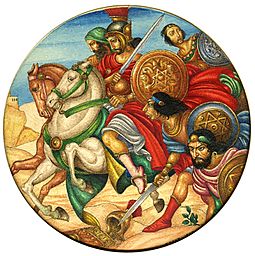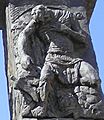Simon bar Kokhba facts for kids
Quick facts for kids Bar Kokhba |
|
|---|---|
| Prince of Israel | |

Arthur Szyk, 1927, Bar Kochba, watercolor and gouache on paper.
|
|
| Reign | Led revolt against Rome from 132-135 |
| Born | Simon ben Kosevah |
| Died | 135 CE Betar, Judea |
Simon ben Koseba (Hebrew: שִׁמְעוֹן בַּר כֹסֵבָא, romanized: Šīmʾōn bar Ḵōsēḇaʾ) was a Jewish military leader. He is better known as Bar Kokhba (Hebrew: שִׁמְעוֹן בַּר כּוֹכְבָא, romanized: Šīmʾōn bar Kōḵḇāʾ). He led a big rebellion against the Roman Empire from 132 to 135 CE. This revolt, called the Bar Kokhba revolt, created an independent Jewish state for three years. During this time, Bar Kokhba ruled as a "prince" (nasi). Some religious leaders of his time even thought he might be the long-awaited Messiah. The Romans eventually killed Bar Kokhba in the fortified town of Betar.
Contents
Bar Kokhba's Names
His Original Name
In the 20th century, important documents were found in the Cave of Letters. These papers showed his real name was Simon bar Kosevah (שמעון בר כוסבה). Sometimes it was written as Bar Kosevaʾ (בר כוסבא) or Ben Kosevaʾ (בן כוסבא). It is likely his family name was Koseba. This name might mean his father or his hometown was called Koseva(h). A place called Khirbet Kuwayzibah is thought to be a possible match.
How He Got His Nickname
During the revolt, a wise Jewish leader named Rabbi Akiva believed Simon was the Jewish messiah. Stories say that Rabbi Akiva connected Simon to a prophecy from the Book of Numbers. This prophecy said, "There shall come a star out of Jacob." The Hebrew word for star is kokhav. So, Simon was called Bar Kokhba, meaning "Son of a Star." This nickname became very famous.
Leader of the Revolt
Why the Revolt Started
The Romans had caused a lot of damage during the First Jewish–Roman War (66–73 CE). Even after that, new laws from the Roman Emperors made the Jewish people want to rebel again. The revolt began around 132 CE, when Hadrian was the Roman Emperor. Hadrian sent a large army to stop the rebellion. Bar Kokhba was the recognized leader of Israel. He made sure every Jew joined his fight. Anyone who refused was punished.
The War Against Rome
Many Jews at the time saw this revolt as the start of a special time, the Messianic Age. The Romans had a very hard time at first. The Jewish forces were united, unlike in the First Jewish–Roman War. In that earlier war, different Jewish armies fought each other. Because the Romans were losing many soldiers, they started using a "scorched earth" tactic. This meant they destroyed everything in the land. This made the Jewish people lose hope and made it harder for them to keep fighting.
In the final part of the war, Bar Kokhba found safety in the fortress of Betar. But the Romans surrounded the city and eventually captured it. Ancient writings say that 580,000 Jews were killed during the war. Many towns and villages were also destroyed.
What Happened After the War
The Roman victory was very costly for them. Emperor Hadrian usually started his reports to the Roman Senate with a happy greeting. But after this war, he did not. This showed how difficult and expensive the victory had been. After the war, Hadrian combined the areas of Judaea, Galilee, and Samaria. He created a new Roman province called Syria Palaestina. This was likely done to make people forget about the Jewish land of Judaea.
New Discoveries
In recent years, new information about the revolt has been found. Several collections of letters were discovered in the Cave of Letters. This cave is located near the Dead Sea. Some of these letters might have been written by Bar Kokhba himself. You can see these important letters at the Israel Museum.
His Ideas and Language
An Israeli archaeologist named Yigael Yadin believed Bar Kokhba wanted to bring back the Hebrew language. He wanted Hebrew to be the official language for the Jews. This was part of his idea that a special time, a messianic age, was coming. Yadin said that Bar Kokhba likely ordered this change. He wanted to make Hebrew the main language of his new state.
Bar Kokhba's Character
"From Shimʻon ben Cosibah to Yeshuʻa ben Galgulah and to the men of the Gader, Peace. I call heaven to my witness that I am fed-up with the Galileans that be with you, every man! [And] that I am resolved to put fetters on your feet, just as I did to Ben ʻAflul."
(Original Hebrew)
משמעון בן כוסבה לישע בן ג[ל]גלה ולאנשי הכרך שלו[ם]. מעיד אני עלי ת שמים יפס[ד] מן הגללאים שהצלכם כל אדם שאני נתן תכבלים ברגלכם כמה שעסת[י] לבן עפלול [ש]מעון ב[ן]
Stories from the Talmud
Jewish religious writings, called the Talmud, describe Simon bar Kokhba as a strong leader. They say he led an army of about 200,000 Jewish fighters. The Talmud also tells a story about him asking his young soldiers to prove their bravery. He would tell them to show their courage before joining his army.
When he went to battle, he was said to pray: "Oh Master of the universe, we don't need your help against our enemies. Just don't let us be embarrassed!" It is also said that he made a mistake by harming his uncle, Rabbi Elazar Hamudaʻi. He suspected his uncle of helping the enemy. This action, it is believed, caused him to lose divine protection. This led to the destruction of Betar, where Bar Kokhba himself died.
Emperor Hadrian is thought to have personally watched the final battles at Betar. After Bar Kokhba died, Hadrian reportedly said that only God could have defeated him.
What Eusebius Wrote
According to a historian named Eusebius, Bar Kokhba was a very strict leader. He punished any Jew who did not join his army. Eusebius also wrote that Bar Kokhba severely punished Christians. He tortured them in different ways because they refused to fight against the Romans.
See also
 In Spanish: Simón bar Kojba para niños
In Spanish: Simón bar Kojba para niños
- Bar Kokhba Revolt coinage
- Bar Kokhba weights
- Jewish Messiah claimants
- Lukuas
Images for kids
-
Simon bar Kokhba on the Knesset Menorah
-
Bar Kokhba silver Shekel/tetradrachm. Front: the Jewish Temple with a rising star, surrounded by "Shimon". Back: a lulav and etrog, with text saying: "to the freedom of Jerusalem"
 | Lonnie Johnson |
 | Granville Woods |
 | Lewis Howard Latimer |
 | James West |




